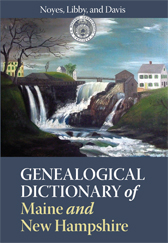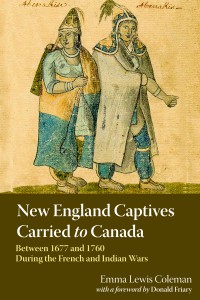 In my previous post, we took a look at some of the resources available for researching ancestors who moved beyond Massachusetts, with a focus on westward movement. Many also headed northward to current-day New Hampshire and Maine, although the area – as the frontier of English colonization and under threat of attack from the French and Indians – was not settled as quickly or densely as Massachusetts during the seventeenth century. According to NEHGS Trustee David Watson Kruger, Pioneers of Maine and New Hampshire, 1623–1660 by Charles Henry Pope is an “important primer on early Maine and New Hampshire families.” Using colonial, town, church, court, and other contemporary records, Pope compiled a list of original immigrants to the area that includes biographical information. Pope notes in his introduction to the book that he treated the two states in one source because “in the origin of their settlements and their political history during the period covered they were so nearly one people.”
In my previous post, we took a look at some of the resources available for researching ancestors who moved beyond Massachusetts, with a focus on westward movement. Many also headed northward to current-day New Hampshire and Maine, although the area – as the frontier of English colonization and under threat of attack from the French and Indians – was not settled as quickly or densely as Massachusetts during the seventeenth century. According to NEHGS Trustee David Watson Kruger, Pioneers of Maine and New Hampshire, 1623–1660 by Charles Henry Pope is an “important primer on early Maine and New Hampshire families.” Using colonial, town, church, court, and other contemporary records, Pope compiled a list of original immigrants to the area that includes biographical information. Pope notes in his introduction to the book that he treated the two states in one source because “in the origin of their settlements and their political history during the period covered they were so nearly one people.”
 A later compilation covering families who settled in the same area prior to 1699 is the Genealogical Dictionary of Maine and New Hampshire by Charles Thornton Libby, Walter Goodwin Davis, and Sybil Noyes. According to David Curtis Dearborn, NEHGS Genealogist Emeritus, the Dictionary “represents one of the most thorough and exhaustive studies of an entire population ever undertaken. Rather than rely on earlier, uncritical secondary sources, the compilers dispassionately sifted and collated a wealth of primary sources . . . to see patterns, make connections, and reach conclusions that had eluded their predecessors.” In addition to listing births, marriages, and deaths, the sketches provide information on places of origin, residences, wills and deeds, court cases, and careers. Not only is the book thorough, but for many of its subjects, according to Dearborn, “it remains today the only source in which their names appear in print.”
A later compilation covering families who settled in the same area prior to 1699 is the Genealogical Dictionary of Maine and New Hampshire by Charles Thornton Libby, Walter Goodwin Davis, and Sybil Noyes. According to David Curtis Dearborn, NEHGS Genealogist Emeritus, the Dictionary “represents one of the most thorough and exhaustive studies of an entire population ever undertaken. Rather than rely on earlier, uncritical secondary sources, the compilers dispassionately sifted and collated a wealth of primary sources . . . to see patterns, make connections, and reach conclusions that had eluded their predecessors.” In addition to listing births, marriages, and deaths, the sketches provide information on places of origin, residences, wills and deeds, court cases, and careers. Not only is the book thorough, but for many of its subjects, according to Dearborn, “it remains today the only source in which their names appear in print.”
 And for a closer look at life in these outlying areas, researchers can turn to New England Captives Carried to Canada Between 1677 and 1760 During the French and Indian Wars by Emma Lewis Coleman. Building on the foundation of a book written by C. Alice Baker, Coleman’s work lists all the captives that the two women discovered in their research, providing biographical information for each. In addition, Coleman recounts the French and Indian raids on frontier areas of Massachusetts, Maine, and New Hampshire, giving historical context. I quickly forget the reason for consulting this book once I start reading snippets of the stories told here and have to remind myself to get back to work. As described by NEHGS Trustee Donald Friary, this book is “a mine for the historian, for the genealogist, and for the general reader capturing the excitement of the English-French-Native borderlands.”
And for a closer look at life in these outlying areas, researchers can turn to New England Captives Carried to Canada Between 1677 and 1760 During the French and Indian Wars by Emma Lewis Coleman. Building on the foundation of a book written by C. Alice Baker, Coleman’s work lists all the captives that the two women discovered in their research, providing biographical information for each. In addition, Coleman recounts the French and Indian raids on frontier areas of Massachusetts, Maine, and New Hampshire, giving historical context. I quickly forget the reason for consulting this book once I start reading snippets of the stories told here and have to remind myself to get back to work. As described by NEHGS Trustee Donald Friary, this book is “a mine for the historian, for the genealogist, and for the general reader capturing the excitement of the English-French-Native borderlands.”
Used as a buffer between Boston and New French via Puritan dictate….. the Province of Maine/Acadia never had a chance to develop. As Anglican, non-conformists to the Puritan oligarchy and often either Catholic or sympathetic to Rome …. these pioneers were expendable in the eyes of the Boston don ! The fate of Maine was sealed when their protector, Sir Edmund Andros was imprison by the dons. While the William and Mary Charter of 1691 was one of the determinants in the fall of the Extreme Puritan cause — their abuse and damage to Maine still continued.
As to the actual historical situation from the English perspective (people, events, facts) Up North & Down East, may I recommend:
Clark, Charles E., The Eastern Frontier : the settlement of Northern New England, 1610-1763. New York : Knopf, 1970. The Society’s first edition has a call number of F7 .C6 1970 on the 5th floor stacks. I have consulted it there. Also, hardcover & trade copies can be found at Abebooks & Amazon. This is a necessary book in the same way as L. K. Mathews’ Expansion of New England still is after 100+ years. However, as much new in-depth research has appeared in various journals, it probably ought to be revised by someone. It’s genealogical component is very good, unless you want to wade through every index in each of J. P. Baxter’s Documentary History of Maine.
For the Native-Americans as the Independent Political Players they were, may I recommend:
Morrison, Kenneth M. The Embattled Northeast: The Elusive Ideal of Alliance in Abenaki-Euramerican Relations. Berkeley: U. of California Press, 1984. The Society does not have a copy! (Looks like I’ll have to donate my extra copy.) However, Google has almost all of the text up under its Books program–
https://books.google.com/books?id=Gu7ws1jOaQoC&printsec=frontcover#v=onepage&q&f=false
It has appeared in trade paper and so is available from Abebooks & Amazon, too. A very useful work still, especially for those reading New England Captives.
For the French Perspective “Looking South”, I know of no single work such as the above. A good number of articles, with very strong genealogical components, on French Canada have been published over the last 20 years in the premiere American Colonial History magazine, William & Marty Quarterly. The Society has its entire modern run, as do many public libraries (consult World Catalog for those nearest you). Also, it is now searchable online by keyword and article title through JSTOR, though paying them for a copy is an arm and a leg, but free if you have an academic pass and your college/university subscribes.
For what came after for NH & Maine, when Massachusetts became a province, see:
Banks, Ronald F. Maine Becomes A State: The Movement To Separate Maine From Massachusetts, 1785-1820. Middletown, Connecticut : Published for the Maine Historical Society by Wesleyan University Press, 1970. The Society call number is F24 .B35 1970. The first chapter covers the ground between 1763 and 1785.
While the Dream of Norumbega/Acadia was strong in many people’s imaginations over nearly two centuries, especially in the Bay Colony (cf the Clark & Lake Proprietors, and Richard Wharton-Pejepscot Proprietors, etc), the reality on the ground among the Riverine & Coastal peoples was — they went their own way, doing their own thing ALWAYS, and THAT they do to this day. What we’ve come to call the Puritan Oligarchy was just ignored–except when monies were needed to fight & defend against the Native-Americans. Then Boston was good for something!
For a critical and must read work detailing the earliest English settlers of the Province of Maine—–Anglican and non-conformists to the Boston Puritan theocracy, alike —- none is more compelling than is the, “Pioneers on Maine Rivers” by Wilbur D. Spencer. (1930) 2006.
And for an overall review of the history of Maine from the long ignored French, Catholic and as well Anglican perspective no one has done a more accurate job than has the late Maine State Liberian, Herbert Edgar Holmes in his epic , ” The Makers of Maine; Essays and Tales of Early Maine History, from the First Explorations to the Fall of Louisberg, Including the Story of the Norse Expeditions”. (19120.
* Sigh *
Dave Dearborn’s cited comments, likely from this DGNE reprint’s introduction, give the game away re the uncalled for reprinting of Pope’s NH-ME Pioneers. It was the incompleteness and shoddy work by Pope and his hired researchers that spurred Davis, Libby & Noyes to achieve “one of the most thorough and exhaustive studies of an entire population every undertaken” and thus, for many, “the only source in which their names appear in print” so as to facilitate a researcher’s work. So “GO! GDNE.” Leave Pope to gather dust on its 6th Floor shelf space.
The Society’s “shield” should decorate the front covers of books that are quality in content and add real value for the researcher, like New England Captives.
And the “Society” should definitely let the late Harvard don Perry Miller lay in rest —- the Mass. Based Puritans were cruel tyrants and it took the Salem Witch Trials for the suppressed populace to finally figure this out!